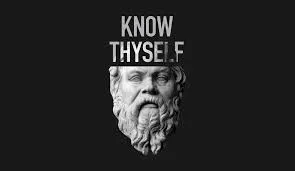
Source
Take a trip with me on an imaginary timeship, and let us journey over two millennia into the past, the fifth century BC, to be exact. There, in Athens, Greece, was a man named Socrates, a soldier, a teacher, and most importantly, a philosopher. A time jump back to the present reveals that he is credited as the founding father of Western philosophy. Socrates never penned down any books, but we know of his “Socratic method” through the writings of his students, chiefly Plato and Xenophon.
The Socratic method is a term coined to label the system of inquiry developed by Socrates that involved asking a series of carefully constructed questions that provoke critical thinking, improved awareness, and ultimately, a better understanding of the topic at hand. Although, it is not fully certain that Socrates himself ever uttered these specific words, the Socratic method can be distilled down to one famous Greek maxim often associated with him. The maxim–”Man, know thyself.” This timeless maxim has left an ineffaceable mark on the history of philosophy and continues to resonate with people seeking to understand themselves and their place in the world.
Human personality is unfathomable. We are unbelievably complex and nested in systems that are also complex. According to the work of Gerald Edelman, the 1972 Nobel Prize winner in Physiology or Medicine, there are more patterns of connection between neurons in the brain than there are subatomic particles in the observable universe. As a basis for comparison, the observable universe comprises two trillion galaxies, each containing billions of stars and planets. So, in a manner of speaking, humans are the most complex thing we know of in the observable universe, by many orders of magnitude. Therefore, the probability that you can understand yourself in anything approaching totality is exceptionally low. This makes the study of the self daring, hopeless, and complicated.
If the study of the self is ultimately hopeless, why then do we still have to examine this line of discourse? Perhaps it’s for the same reason that we will never attain perfection, yet, we keep striving for it and are actively encouraged to do so. One way to think about it is–”What’s the alternative?” Striving to be more aware of the self and aiming towards self-mastery can be difficult and fraught with hopelessness occasionally, but it sure is better than its alternative. And what’s the alternative, you ask? Chaos. Disorder. All systems tend towards disorder. Without some active force to drive the course of events towards order, systems passively disintegrate. The self disintegrates.
How then can we come to know the self, or whatever fraction of it we can fathom? How do we avert chaos and disorder? What practical applications does the knowledge of the self hold in the real world? These and many more questions will be addressed in sequel articles.
